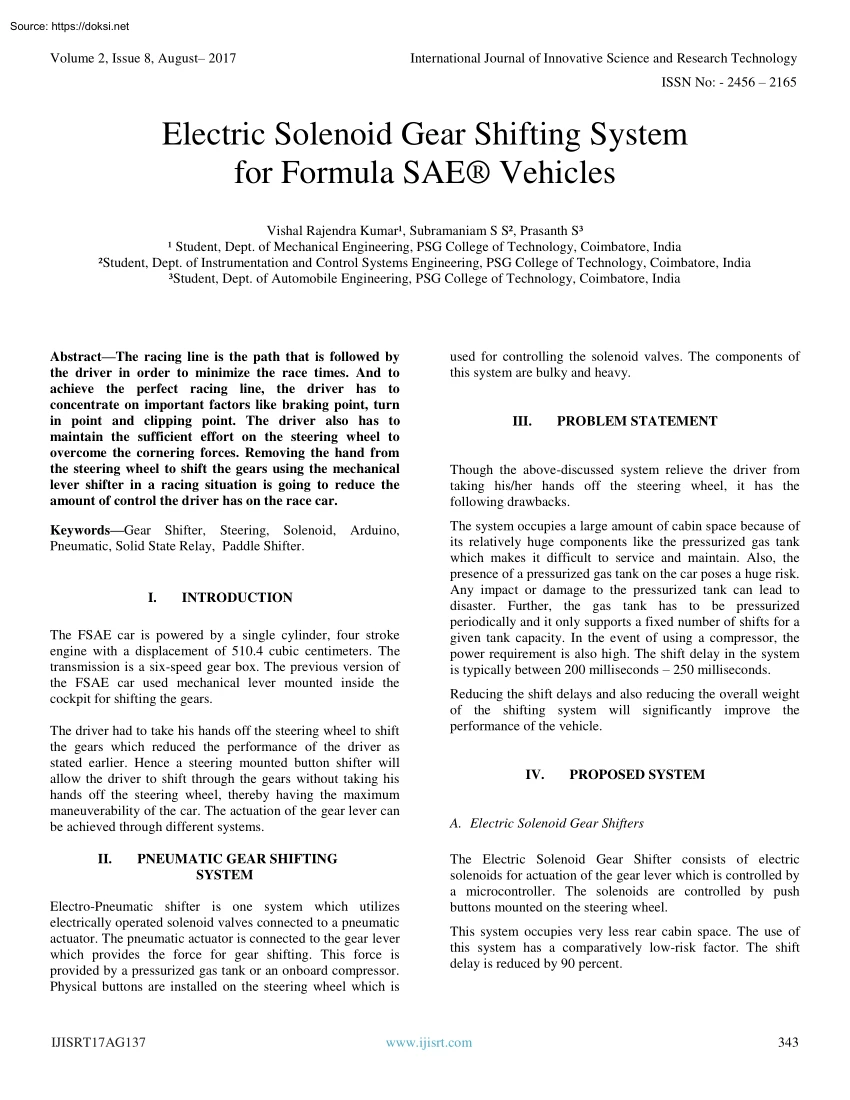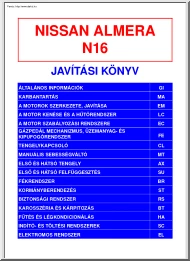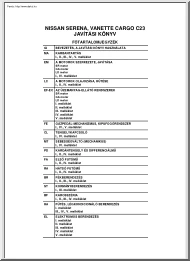Alapadatok
Év, oldalszám:2017, 4 oldal
Nyelv:angol
Letöltések száma:2
Feltöltve:2022. október 03.
Méret:847 KB
Intézmény:
-
Megjegyzés:
PSG College of Technology
Csatolmány:-
Letöltés PDF-ben:Kérlek jelentkezz be!
Értékelések
Nincs még értékelés. Legyél Te az első!Legnépszerűbb doksik ebben a kategóriában
Tartalmi kivonat
Volume 2, Issue 8, August– 2017 International Journal of Innovative Science and Research Technology ISSN No: - 2456 – 2165 Electric Solenoid Gear Shifting System for Formula SAE® Vehicles Vishal Rajendra Kumar¹, Subramaniam S S², Prasanth S³ ¹ Student, Dept. of Mechanical Engineering, PSG College of Technology, Coimbatore, India ²Student, Dept. of Instrumentation and Control Systems Engineering, PSG College of Technology, Coimbatore, India ³Student, Dept. of Automobile Engineering, PSG College of Technology, Coimbatore, India AbstractThe racing line is the path that is followed by the driver in order to minimize the race times. And to achieve the perfect racing line, the driver has to concentrate on important factors like braking point, turn in point and clipping point. The driver also has to maintain the sufficient effort on the steering wheel to overcome the cornering forces. Removing the hand from the steering wheel to shift the gears using the mechanical lever shifter
in a racing situation is going to reduce the amount of control the driver has on the race car. used for controlling the solenoid valves. The components of this system are bulky and heavy. KeywordsGear Shifter, Steering, Solenoid, Pneumatic, Solid State Relay, Paddle Shifter. The system occupies a large amount of cabin space because of its relatively huge components like the pressurized gas tank which makes it difficult to service and maintain. Also, the presence of a pressurized gas tank on the car poses a huge risk. Any impact or damage to the pressurized tank can lead to disaster. Further, the gas tank has to be pressurized periodically and it only supports a fixed number of shifts for a given tank capacity. In the event of using a compressor, the power requirement is also high. The shift delay in the system is typically between 200 milliseconds – 250 milliseconds. I. Arduino, INTRODUCTION The FSAE car is powered by a single cylinder, four stroke engine with a displacement
of 510.4 cubic centimeters The transmission is a six-speed gear box. The previous version of the FSAE car used mechanical lever mounted inside the cockpit for shifting the gears. The driver had to take his hands off the steering wheel to shift the gears which reduced the performance of the driver as stated earlier. Hence a steering mounted button shifter will allow the driver to shift through the gears without taking his hands off the steering wheel, thereby having the maximum maneuverability of the car. The actuation of the gear lever can be achieved through different systems. II. PNEUMATIC GEAR SHIFTING SYSTEM Electro-Pneumatic shifter is one system which utilizes electrically operated solenoid valves connected to a pneumatic actuator. The pneumatic actuator is connected to the gear lever which provides the force for gear shifting. This force is provided by a pressurized gas tank or an onboard compressor. Physical buttons are installed on the steering wheel which is IJISRT17AG137
III. PROBLEM STATEMENT Though the above-discussed system relieve the driver from taking his/her hands off the steering wheel, it has the following drawbacks. Reducing the shift delays and also reducing the overall weight of the shifting system will significantly improve the performance of the vehicle. IV. PROPOSED SYSTEM A. Electric Solenoid Gear Shifters The Electric Solenoid Gear Shifter consists of electric solenoids for actuation of the gear lever which is controlled by a microcontroller. The solenoids are controlled by push buttons mounted on the steering wheel. This system occupies very less rear cabin space. The use of this system has a comparatively low-risk factor. The shift delay is reduced by 90 percent. www.ijisrtcom 343 Volume 2, Issue 8, August– 2017 International Journal of Innovative Science and Research Technology ISSN No: - 2456 – 2165 V. WORKING PRINCIPLE Two push buttons are mounted on the steering wheel. The buttons are ergonomically positioned
according to the driver’s comfort. One button is used for up shifting while the other is used for downshifting. There are two electric solenoids which are connected to the input gear level of the gearbox in the rear engine cabin. The trigger signal from the push buttons is fed into a microprocessor which then energizes the corresponding solenoid through Solid State Relays. The functioning of the system can be understood from Fig. 1 The Steering mounted setup aids the shifting of the gear without the driver taking his hands off the steering wheel. Fig. 2: CAD Model VI. COMPONENTS A. Electric Linear Solenoids The linear electric solenoid is the major component of gear shifting mechanism and it connects directly to the input lever of the transmission gear box and functions to replace the force generated by the human arm. The force required for upshift and downshift were found using a spring balance when the engine was running at idle RPM (1900). The force required for a lever length
of 65mm is shown in Table I and Table II. From (Gear Number) N To (Gear Number) 1 Force (Kgf) 10 1 2 15 2 3 10 3 4 11 4 5 10 5 6 11 Table 1: Force Required for Pushift From (Gear Number) 6 To (Gear Number) 5 Force (Kgf) 11 5 4 11 4 3 10 3 2 11 2 1 15 1 N 11 Fig.1: Functioning of the System The two electric solenoids are connected to the input gear lever of the gearbox as shown in Fig. 2 When the microcontroller sends a signal to the Solid State Relay, it activates the corresponding solenoid and pushes the gear lever and shifting takes place. Similarly, when the driver wants to downshift the down-shift button is pressed. The microprocessor then activates the other solenoid which pulls the gear lever. Table2: Force Required for Downshift IJISRT17AG137 www.ijisrtcom 344 Volume 2, Issue 8, August– 2017 International Journal of Innovative Science and Research Technology ISSN No: - 2456 – 2165 The maximum force required for shifting is
found. The selected solenoid provides a maximum force of 166.6 N The solenoid works at 12V. Each solenoid weighs 112 Kg The solenoid was wired as per the troubleshooting guide [1]. B. Solid State Relays A solid-state relay (SSR) is an electronic switching device that switches on or off when a small external voltage is applied across its control terminals. This external voltage is supplied by the microprocessor. An ideal gear shifter will have zero or very negligible shift delay. SSRs switch faster than electromechanical relays The switching time of a typical optically coupled SSR of the order of milliseconds which make it an ideal choice. The SSR (Fig. 3), that is used can switch current loads of up to 40A with a 3-32V DC [2] input and a zero cross trigger control method. Each one of these relays is equipped with four screw terminals (for use with ring or fork connectors) and a plastic cover that slides over the top of the relay to protect the terminal. D. Push Button Switches
Momentary SPST (Single Pole Single Throw) Normally Open switches are used for triggering the gear shift. Two of these switches are mounted on the steering wheel. Trigger signal has to be generated only when the driver presses the switches, hence momentary normally open switches are used. VII. ELECTRONIC UNIT A. Circuit Diagram The connections are given as per Fig. 4 The load terminal of solid state relay controls the flow of current through Solenoid. The opt coupler of the SSR provides isolation between the triggering circuit and high power circuit. B Algorithm The configuration of the gearbox is 1 - N - 2 - 3 - 4 - 5 - 6. The algorithm prevents accidental shifts when the both the buttons are pressed. When the upshift button is pressed, the current gear value is incremented. The value is processed by the microprocessor and the corresponding solenoid is activated. Fig. 3: Solid State Relay C. Microcontroller ArduinoMega2560 was the chosen microcontroller board which is based on the
Atmega2560. It was decided to build RPM meter and gear shift indicator along with the shifting system. ArduinoMega2560’s [3] increased number of analog/digital input and output pins made it the most suitable. Required libraries were downloaded from online repositories [4]. The gear shift indicator and the RPM meter are mounted on the dash board. IJISRT17AG137 Fig. 4: Circuit Diagram A rotary potentiometer is attached to the pivot point of the input gear shift lever and it sends the signal to the microprocessor. This is used for indicating the current gear Hence the electronic gear shifter acts as a closed loop system. The potentiometer measures angular displacement of the shifter and will compensate the error by actuating the solenoids. www.ijisrtcom 345 Volume 2, Issue 8, August– 2017 International Journal of Innovative Science and Research Technology ISSN No: - 2456 – 2165 The sketch for the ArduinoMega2560 also includes the code for the RPM meter and the gear shift
indicator. The values are displayed on a 16 X 2 LCD Display which is mounted on the dashboard. VIII. FABRICATION AND ASSEMBLY The two solenoids are mounted onto the bracket through fasteners. The bracket is installed in the rear engine cabin near the input gear lever of the transmission gearbox. They are parallel at a distance of 140mm. Cotter pins are used at the ends of solenoid’s plungers for easy dismantling as seen in the Fig. 5 and Fig 6 The steering wheel was cut from an aluminum sheet of thickness 5 mm. Slots are cut where the two buttons are pressfitted into the aluminum frames as shown in the Fig. 7 The buttons are positioned ergonomically for easy access. Fig. 7: Steering Wheel with Push Buttons IX. RESULTS AND DISCUSSION The electric gear shifting mechanism using solenoids proved to be successful. With the use of the system, the driver can shift the gears without taking his hands off the steering wheel. The shift delay is 15 milliseconds. The weight of the entire
system is under 4kg. The system can be easily dismantled for service and maintenance as it has few parts. X. ACKNOWLEDGMENT We thank the members of Pegasus Racing, the Formula Student team of PSG College of Technology, Coimbatore for their valuable contribution in making this project a success. Fig.5: Plunger Rods Attached to Input Gear Lever of Gearbox (Front View). REFERENCES [1]. Woodward Industrial Controls Engineering Services, Solenoid Troubleshooting Guide, Mar. 2010 [2]. Jameco Electronics, DC Solid State Relay K series, 172591 Datasheet, http://www.jamecocom/Jameco/Products/ProdDS/17259 1.pdf [3]. Atmel, “8-bit Atmel Microcontroller with 16/32/64KB InSystem Programmable Flash”, Atmel ATmega640/V1280/V-1281/V-2560/V-2561/V Datasheet, Feb 2014 [4]. Arduino Playground (2005) Arduino. http://playground.arduinocc/Main/InterfacingWithHardw are . Fig. 6: Plunger Rods Attached to Input Gear Lever of Gearbox (Side View). IJISRT17AG137 www.ijisrtcom 346
in a racing situation is going to reduce the amount of control the driver has on the race car. used for controlling the solenoid valves. The components of this system are bulky and heavy. KeywordsGear Shifter, Steering, Solenoid, Pneumatic, Solid State Relay, Paddle Shifter. The system occupies a large amount of cabin space because of its relatively huge components like the pressurized gas tank which makes it difficult to service and maintain. Also, the presence of a pressurized gas tank on the car poses a huge risk. Any impact or damage to the pressurized tank can lead to disaster. Further, the gas tank has to be pressurized periodically and it only supports a fixed number of shifts for a given tank capacity. In the event of using a compressor, the power requirement is also high. The shift delay in the system is typically between 200 milliseconds – 250 milliseconds. I. Arduino, INTRODUCTION The FSAE car is powered by a single cylinder, four stroke engine with a displacement
of 510.4 cubic centimeters The transmission is a six-speed gear box. The previous version of the FSAE car used mechanical lever mounted inside the cockpit for shifting the gears. The driver had to take his hands off the steering wheel to shift the gears which reduced the performance of the driver as stated earlier. Hence a steering mounted button shifter will allow the driver to shift through the gears without taking his hands off the steering wheel, thereby having the maximum maneuverability of the car. The actuation of the gear lever can be achieved through different systems. II. PNEUMATIC GEAR SHIFTING SYSTEM Electro-Pneumatic shifter is one system which utilizes electrically operated solenoid valves connected to a pneumatic actuator. The pneumatic actuator is connected to the gear lever which provides the force for gear shifting. This force is provided by a pressurized gas tank or an onboard compressor. Physical buttons are installed on the steering wheel which is IJISRT17AG137
III. PROBLEM STATEMENT Though the above-discussed system relieve the driver from taking his/her hands off the steering wheel, it has the following drawbacks. Reducing the shift delays and also reducing the overall weight of the shifting system will significantly improve the performance of the vehicle. IV. PROPOSED SYSTEM A. Electric Solenoid Gear Shifters The Electric Solenoid Gear Shifter consists of electric solenoids for actuation of the gear lever which is controlled by a microcontroller. The solenoids are controlled by push buttons mounted on the steering wheel. This system occupies very less rear cabin space. The use of this system has a comparatively low-risk factor. The shift delay is reduced by 90 percent. www.ijisrtcom 343 Volume 2, Issue 8, August– 2017 International Journal of Innovative Science and Research Technology ISSN No: - 2456 – 2165 V. WORKING PRINCIPLE Two push buttons are mounted on the steering wheel. The buttons are ergonomically positioned
according to the driver’s comfort. One button is used for up shifting while the other is used for downshifting. There are two electric solenoids which are connected to the input gear level of the gearbox in the rear engine cabin. The trigger signal from the push buttons is fed into a microprocessor which then energizes the corresponding solenoid through Solid State Relays. The functioning of the system can be understood from Fig. 1 The Steering mounted setup aids the shifting of the gear without the driver taking his hands off the steering wheel. Fig. 2: CAD Model VI. COMPONENTS A. Electric Linear Solenoids The linear electric solenoid is the major component of gear shifting mechanism and it connects directly to the input lever of the transmission gear box and functions to replace the force generated by the human arm. The force required for upshift and downshift were found using a spring balance when the engine was running at idle RPM (1900). The force required for a lever length
of 65mm is shown in Table I and Table II. From (Gear Number) N To (Gear Number) 1 Force (Kgf) 10 1 2 15 2 3 10 3 4 11 4 5 10 5 6 11 Table 1: Force Required for Pushift From (Gear Number) 6 To (Gear Number) 5 Force (Kgf) 11 5 4 11 4 3 10 3 2 11 2 1 15 1 N 11 Fig.1: Functioning of the System The two electric solenoids are connected to the input gear lever of the gearbox as shown in Fig. 2 When the microcontroller sends a signal to the Solid State Relay, it activates the corresponding solenoid and pushes the gear lever and shifting takes place. Similarly, when the driver wants to downshift the down-shift button is pressed. The microprocessor then activates the other solenoid which pulls the gear lever. Table2: Force Required for Downshift IJISRT17AG137 www.ijisrtcom 344 Volume 2, Issue 8, August– 2017 International Journal of Innovative Science and Research Technology ISSN No: - 2456 – 2165 The maximum force required for shifting is
found. The selected solenoid provides a maximum force of 166.6 N The solenoid works at 12V. Each solenoid weighs 112 Kg The solenoid was wired as per the troubleshooting guide [1]. B. Solid State Relays A solid-state relay (SSR) is an electronic switching device that switches on or off when a small external voltage is applied across its control terminals. This external voltage is supplied by the microprocessor. An ideal gear shifter will have zero or very negligible shift delay. SSRs switch faster than electromechanical relays The switching time of a typical optically coupled SSR of the order of milliseconds which make it an ideal choice. The SSR (Fig. 3), that is used can switch current loads of up to 40A with a 3-32V DC [2] input and a zero cross trigger control method. Each one of these relays is equipped with four screw terminals (for use with ring or fork connectors) and a plastic cover that slides over the top of the relay to protect the terminal. D. Push Button Switches
Momentary SPST (Single Pole Single Throw) Normally Open switches are used for triggering the gear shift. Two of these switches are mounted on the steering wheel. Trigger signal has to be generated only when the driver presses the switches, hence momentary normally open switches are used. VII. ELECTRONIC UNIT A. Circuit Diagram The connections are given as per Fig. 4 The load terminal of solid state relay controls the flow of current through Solenoid. The opt coupler of the SSR provides isolation between the triggering circuit and high power circuit. B Algorithm The configuration of the gearbox is 1 - N - 2 - 3 - 4 - 5 - 6. The algorithm prevents accidental shifts when the both the buttons are pressed. When the upshift button is pressed, the current gear value is incremented. The value is processed by the microprocessor and the corresponding solenoid is activated. Fig. 3: Solid State Relay C. Microcontroller ArduinoMega2560 was the chosen microcontroller board which is based on the
Atmega2560. It was decided to build RPM meter and gear shift indicator along with the shifting system. ArduinoMega2560’s [3] increased number of analog/digital input and output pins made it the most suitable. Required libraries were downloaded from online repositories [4]. The gear shift indicator and the RPM meter are mounted on the dash board. IJISRT17AG137 Fig. 4: Circuit Diagram A rotary potentiometer is attached to the pivot point of the input gear shift lever and it sends the signal to the microprocessor. This is used for indicating the current gear Hence the electronic gear shifter acts as a closed loop system. The potentiometer measures angular displacement of the shifter and will compensate the error by actuating the solenoids. www.ijisrtcom 345 Volume 2, Issue 8, August– 2017 International Journal of Innovative Science and Research Technology ISSN No: - 2456 – 2165 The sketch for the ArduinoMega2560 also includes the code for the RPM meter and the gear shift
indicator. The values are displayed on a 16 X 2 LCD Display which is mounted on the dashboard. VIII. FABRICATION AND ASSEMBLY The two solenoids are mounted onto the bracket through fasteners. The bracket is installed in the rear engine cabin near the input gear lever of the transmission gearbox. They are parallel at a distance of 140mm. Cotter pins are used at the ends of solenoid’s plungers for easy dismantling as seen in the Fig. 5 and Fig 6 The steering wheel was cut from an aluminum sheet of thickness 5 mm. Slots are cut where the two buttons are pressfitted into the aluminum frames as shown in the Fig. 7 The buttons are positioned ergonomically for easy access. Fig. 7: Steering Wheel with Push Buttons IX. RESULTS AND DISCUSSION The electric gear shifting mechanism using solenoids proved to be successful. With the use of the system, the driver can shift the gears without taking his hands off the steering wheel. The shift delay is 15 milliseconds. The weight of the entire
system is under 4kg. The system can be easily dismantled for service and maintenance as it has few parts. X. ACKNOWLEDGMENT We thank the members of Pegasus Racing, the Formula Student team of PSG College of Technology, Coimbatore for their valuable contribution in making this project a success. Fig.5: Plunger Rods Attached to Input Gear Lever of Gearbox (Front View). REFERENCES [1]. Woodward Industrial Controls Engineering Services, Solenoid Troubleshooting Guide, Mar. 2010 [2]. Jameco Electronics, DC Solid State Relay K series, 172591 Datasheet, http://www.jamecocom/Jameco/Products/ProdDS/17259 1.pdf [3]. Atmel, “8-bit Atmel Microcontroller with 16/32/64KB InSystem Programmable Flash”, Atmel ATmega640/V1280/V-1281/V-2560/V-2561/V Datasheet, Feb 2014 [4]. Arduino Playground (2005) Arduino. http://playground.arduinocc/Main/InterfacingWithHardw are . Fig. 6: Plunger Rods Attached to Input Gear Lever of Gearbox (Side View). IJISRT17AG137 www.ijisrtcom 346





 Útmutatónk teljes körűen bemutatja az angoltanulás minden fortélyát, elejétől a végéig, szinttől függetlenül. Ha elakadsz, ehhez az íráshoz bármikor fordulhatsz, biztosan segítségedre lesz. Egy a fontos: akarnod kell!
Útmutatónk teljes körűen bemutatja az angoltanulás minden fortélyát, elejétől a végéig, szinttől függetlenül. Ha elakadsz, ehhez az íráshoz bármikor fordulhatsz, biztosan segítségedre lesz. Egy a fontos: akarnod kell!